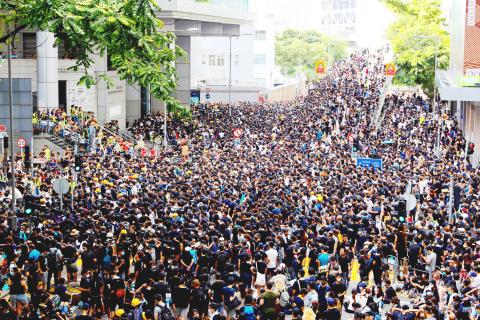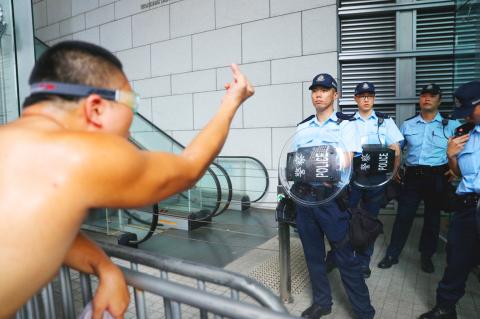Thousands of protesters yesterday evening blockaded the Hong Kong police headquarters, demanding the resignation of the territory’s pro-Beijing leader and the release of demonstrators arrested during Hong Kong’s worst political crisis in decades.
The latest protest comes after the government refused to meet the demands of demonstrators who have marched in their millions to oppose a bill that would allow extraditions to the mainland.
Opposition groups, after putting on the biggest political rallies in Hong Kong’s history, have called for the complete withdrawal of the extradition legislation and for Hong Kong Chief Executive Carrie Lam (林鄭月娥) to step down, but the movement has also morphed into a wider expression of public anger at Lam and leaders in Beijing after years of sliding political freedoms.

Photo: AP
Throughout yesterday the predominantly young, leaderless protesters used spontaneity and movement to up the pressure on authorities.
Peaceful civil disobedience was used across key parts of the territory’s commercial district, with a main roadway seized and two government offices briefly blocked, but the focus for the day and into the evening was police headquarters, where thousands gathered, many chanting “release the righteous” and “shame on police thugs” — references to those detained during violence last week between demonstrators and the police.
Anger toward the police force has exploded since officers on Wednesday last week used rubber bullets and tear gas to clear crowds of protesters from the streets.

Photo: EPA-EFE
Opposition groups have demanded an investigation into allegations of police brutality and the release of those detained during the clashes, in addition to Lam’s ouster and a cancelation of the extradition bill.
Rights group Amnesty International yesterday said that it had verified multiple instances of police violence that breached international laws, while the Hong Kong Bar Association added its voice to calls for an investigation into police tactics.
Crowds outside police headquarters grew in the evening as workers joined the largely student-led protest, where demonstrators used metal barricades to fortify their positions, and used unfurled umbrellas and masking tape to obscure CCTV cameras.
Police held back from any response, and with the exception of a few thrown eggs, the demonstration remained peaceful.
Earlier in the day, smaller groups of protesters briefly blocked the entrances to the nearby immigration and revenue departments.
“We need to flow like water,” to be able to retreat and regroup and adapt, said protester Chris, referencing a famous quote from martial arts superstar and Hong Kong legend Bruce Lee (李小龍).
Another protester likened the crowds to artificial intelligence.
“They learn from themselves, nobody really teaches them, they just adapt to different situations,” said Bernard, 21.
The call for the demonstration was made by student unions, as well as informal organizers over social media apps such as Telegram.
“Blossom everywhere,” read a statement circulated on Thursday in a Telegram chat group.
Lam has so far defied calls to step down, and while she has apologized and suspended the bill indefinitely, it has failed to quell anger.
Pro-democracy demonstrators have vowed to hold another mass rally on July 1.
Opponents of the extradition bill fear it will ensnare Hong Kongers in China’s opaque and politicized justice system, and also give Beijing a tool to target critics based in the semi-autonomous territory.
Separately yesterday, former Philippine secretary of foreign affairs Albert del Rosario — a critic of China’s claims in the disputed South China Sea — was denied entry to Hong Kong and deported, his lawyer said, adding that he was not given a reason for the expulsion.
Hong Kong immigration authorities did not immediately respond to a request for comment.

The CIA has a message for Chinese government officials worried about their place in Chinese President Xi Jinping’s (習近平) government: Come work with us. The agency released two Mandarin-language videos on social media on Thursday inviting disgruntled officials to contact the CIA. The recruitment videos posted on YouTube and X racked up more than 5 million views combined in their first day. The outreach comes as CIA Director John Ratcliffe has vowed to boost the agency’s use of intelligence from human sources and its focus on China, which has recently targeted US officials with its own espionage operations. The videos are “aimed at

STEADFAST FRIEND: The bills encourage increased Taiwan-US engagement and address China’s distortion of UN Resolution 2758 to isolate Taiwan internationally The Presidential Office yesterday thanked the US House of Representatives for unanimously passing two Taiwan-related bills highlighting its solid support for Taiwan’s democracy and global participation, and for deepening bilateral relations. One of the bills, the Taiwan Assurance Implementation Act, requires the US Department of State to periodically review its guidelines for engagement with Taiwan, and report to the US Congress on the guidelines and plans to lift self-imposed limitations on US-Taiwan engagement. The other bill is the Taiwan International Solidarity Act, which clarifies that UN Resolution 2758 does not address the issue of the representation of Taiwan or its people in

US Indo-Pacific Commander Admiral Samuel Paparo on Friday expressed concern over the rate at which China is diversifying its military exercises, the Financial Times (FT) reported on Saturday. “The rates of change on the depth and breadth of their exercises is the one non-linear effect that I’ve seen in the last year that wakes me up at night or keeps me up at night,” Paparo was quoted by FT as saying while attending the annual Sedona Forum at the McCain Institute in Arizona. Paparo also expressed concern over the speed with which China was expanding its military. While the US

SHIFT: Taiwan’s better-than-expected first-quarter GDP and signs of weakness in the US have driven global capital back to emerging markets, the central bank head said The central bank yesterday blamed market speculation for the steep rise in the local currency, and urged exporters and financial institutions to stay calm and stop panic sell-offs to avoid hurting their own profitability. The nation’s top monetary policymaker said that it would step in, if necessary, to maintain order and stability in the foreign exchange market. The remarks came as the NT dollar yesterday closed up NT$0.919 to NT$30.145 against the US dollar in Taipei trading, after rising as high as NT$29.59 in intraday trading. The local currency has surged 5.85 percent against the greenback over the past two sessions, central